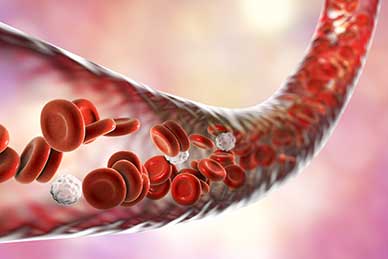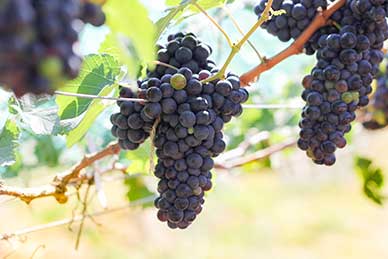Most people have heard of the health benefits of vitamin C, vitamin E and calcium. However, there are many compounds that may improve our health that have only recently been discovered. One of these compounds is a flavonoid called quercetin that appears to protect the cardiovascular system by helping to maintain healthy cholesterol and blood pressure within normal ranges while also protecting muscles from oxidation. What is this flavonoid? How can you get more of it in your diet?
Flavonoids: More Than Flavor
Scientists and doctors once recommended getting five servings of fruits and vegetables a day. This advice has been modified recently to a recommendation to eat produce of all the colors of the rainbow. Why is eating colorful foods now considered important? It ends up that the compounds that give fruits and vegetables their color and strong taste also have positive effects on our health. One of these flavonoids purported to benefit our health is a compound called quercetin.
Quercetin is present in strongly flavored vegetables such as capers, chili peppers and onions. In addition, people can get quercetin from leafy greens as well as dark red and purple fruits like black plums. Quercetin’s role in plants is to act as an antioxidant, preventing damage from the sun and pests. In humans it plays much the same role, helping to repair and prevent the damage caused by free radicals. Eating ample amounts of this flavonoid has also been found to help promote healthy cell growth in the past. According to new research, the benefits of quercetin may also include promoting cardiovascular health.
Quercetin Benefits for the Heart, Blood Vessels and Beyond
 Several studies on quercetin have linked it to cardiovascular health. Cardiovascular disease is the top killer in the modern world, contributing to around 40 percent of deaths. Much of the damage is caused by free radicals. Our body needs oxygen to perform critical metabolic processes, but this does not come without a cost. These processes create reactive oxygen species, highly reactive ions that can damage the molecules that make up DNA and other cell components. Over time, this damage can lead to atherosclerosis, the hardening and narrowing of arteries that is one of the top contributors to cardiovascular disease.
Several studies on quercetin have linked it to cardiovascular health. Cardiovascular disease is the top killer in the modern world, contributing to around 40 percent of deaths. Much of the damage is caused by free radicals. Our body needs oxygen to perform critical metabolic processes, but this does not come without a cost. These processes create reactive oxygen species, highly reactive ions that can damage the molecules that make up DNA and other cell components. Over time, this damage can lead to atherosclerosis, the hardening and narrowing of arteries that is one of the top contributors to cardiovascular disease.
Quercetin acts as an antioxidant, meaning it helps neutralize these oxygen compounds and prevent them from causing damage. This antioxidant action can have very tangible results. Men who were given 100mg a day of quercetin had a measurable decrease in their cholesterol. Higher doses were found to lower blood pressure significantly. Even in low doses, quercetin benefits blood vessels by preventing the oxidation of LDL cholesterol, a crucial step in the narrowing of arteries that can contribute to stroke and heart attack.
Healing a Broken Heart?
This data all indicates that quercetin may help to prevent damage to the cardiovascular system. However, new research indicates that this flavonoid may also help heal existing damage. Researchers studied the effects of a quercetin-rich diet on mice with muscular dystrophy, a disease which damages muscles including those that make up the heart. The mice fed a special diet with high amounts of quercetin had less inflammation and less cell damage than mice with muscular dystrophy who were fed a normal diet.
Muscular dystrophy is a rare disease. However, damage to the muscles of hearts and blood vessels is common and contributes to cardiovascular disease. More research will be needed to determine whether quercetin can help to heal cardiovascular damage with causes other than muscular dystrophy, but the evidence is promising.
Are You Getting Enough Quercetin?
 Quercetin is present in a wide variety of antioxidant-rich foods, including:
Quercetin is present in a wide variety of antioxidant-rich foods, including:
- onions of all colors
- capers
- black grapes
- black plums
- dark leafy greens
- hot peppers
- cocoa
- sweet potatoes
- green herbs such as tarragon
- darkly pigmented berries such as lingonberries and blackberries
People who eat a varied, plant-based diet will likely get enough of this compound to enjoy its health effects. However, the standard American diet does not include adequate amounts. Although quercetin is present in a wide variety of foods, these are not foods that most Western people eat in ample quantity. In order to ensure that they are getting a cardioprotective amount of this flavonoid, many people take a supplement that contains quercetin. While it is difficult to find supplements with high enough amounts to get the benefits of quercetin, there are several antioxidant blends on the market that contain it.
The benefits of quercetin are still being studied. However, it appears that this flavonoid may play a very important role in protecting the cardiovascular system as well as other tissues. Whether you get your quercetin from diet or from supplements, it is a good idea to ensure you are getting enough of this little-known nutrient.



Leave a Reply